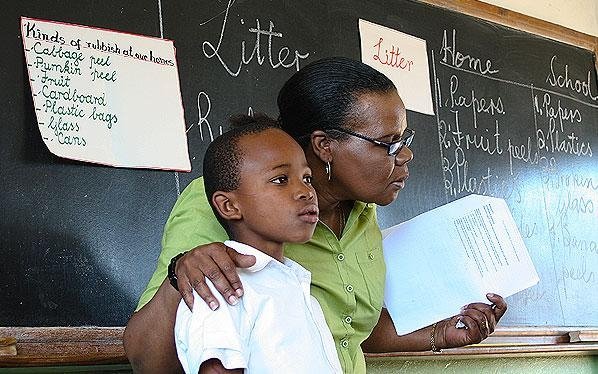Every October 5, Nigeria joins the world to celebrate World Teachers’ Day, yet the irony is painful — the very people shaping the nation’s future remain among its most neglected. From Lagos to Maiduguri, many Nigerian teachers work tirelessly under harsh conditions, earning barely enough to survive.
In 2025, President Bola Tinubu’s administration allocated ₦3.52 trillion to education, with ₦1.64 trillion set aside for personnel costs, including teachers’ salaries. On paper, this looks significant, but in practice, it falls short. Nigeria currently has about 2.3 million registered teachers, and to pay each one a minimum of ₦70,000 monthly, the country would need ₦1.93 trillion yearly. This leaves a ₦290 billion shortfall — proof that the system continues to undervalue its educators.
While the national minimum wage is ₦70,000, many teachers still earn between ₦25,000 and ₦50,000 per month. The reality is stark: a bag of rice costs over ₦60,000, rent in major cities has tripled, and inflation hit 20.12 per cent in August 2025. For educators, that means perpetual struggle — barely surviving while moulding the minds of tomorrow’s leaders.

Table of Contents
The Unseen Weight Teachers Carry
Beyond poor pay, Nigerian teachers face conditions that can only be described as disheartening. In several public schools, classrooms are overcrowded, with a shocking 124 pupils per teacher in some states, according to UNICEF. In the North-East — states like Borno, Yobe, and Adamawa — the ratios are even worse.
The problem extends beyond staffing. Only 54.8 per cent of primary schools nationwide have basic teaching aids; 38.2 per cent of pupils have textbooks for core subjects like Mathematics and English. Even the most essential facilities are scarce: fewer than 40 per cent of schools have usable toilets, and just 27 per cent have clean ones.
These statistics reveal not just administrative failure, but deep disrespect for those holding Nigeria’s education system together. Teachers are often mentally and physically drained, yet remain the only source of stability for millions of children. One teacher described her job as “a calling constantly tested by hardship.”
This daily struggle reflects a system that has normalised neglect. Teachers are expected to perform miracles in classrooms without chalk, fans, or learning materials, while their peers in other professions — medicine, law, and engineering — receive both respect and reward.

Why Teachers’ Reward Cannot Wait
For too long, Nigerians have repeated the saying: “A teacher’s reward is in heaven.” This phrase, though once harmless, has become an excuse to deny educators their earthly dignity. Teachers cannot be expected to build the nation’s future while their present is left in ruins.
Education experts agree that no nation develops beyond the quality of its teachers. Yet, policies continue to treat them as an afterthought. Mary Udenta, a veteran educator, once said: “Education doesn’t end with graduation; it evolves. But how can a teacher evolve without support?”
Similarly, Elizabeth Ohaka, a school owner, insists that “a happy teacher makes a happy student.” When teachers are demoralised, students suffer — creating a cycle of underperformance that ripples through society.
Nigeria’s continued neglect of its teachers is not just an economic issue; it’s a national crisis. Every underpaid, unmotivated teacher represents a classroom where potential is wasted. Every unpaid salary is a lesson delayed. Every untrained educator is a generation disadvantaged.
A Call to Honour and Reform
If Nigeria is serious about development, teacher welfare must become a national priority, not a yearly slogan. The following steps are crucial to breaking the cycle of neglect:
- Close the salary gap immediately. The ₦290 billion budget shortfall is unacceptable. Teachers’ salaries must be paid promptly and fairly, reflecting the nation’s appreciation of their work.
- Introduce a realistic living wage. The ₦70,000 minimum wage is insufficient given current inflation. Teachers deserve a tiered pay structure that recognises experience, qualifications, and regional cost of living.
- Prioritise training and career growth. Regular professional development, mentorship, and promotion opportunities will help teachers stay motivated and competent.
- Fix infrastructure and learning conditions. Every teacher should have access to proper classrooms, textbooks, and teaching tools. A functional environment boosts both morale and learning outcomes.
- Rebrand the teaching profession. Through media, policy, and culture, Nigeria must restore respect for teachers. Their role should be celebrated daily, not just on October 5.
The government cannot do it alone. Private institutions, communities, and alumni networks must also invest in teacher welfare and development. After all, no child — rich or poor — thrives without a teacher’s guidance.

Conclusion: Reward Them Now, Not Later
Teachers are not angels waiting for their reward in heaven; they are professionals who deserve fair pay, respect, and the resources to perform their duties effectively. If the Nigerian government truly wants to strengthen its human capital, it must start with the men and women standing at the chalkboard every day.
Their reward should not come in eternity. It must come now — in salaries that reflect their worth, in policies that protect their dignity, and in a national culture that finally recognises teaching for what it truly is: the foundation of every nation’s greatness.
Join Our Social Media Channels:
WhatsApp: NaijaEyes
Facebook: NaijaEyes
Twitter: NaijaEyes
Instagram: NaijaEyes
TikTok: NaijaEyes
READ THE LATEST EDUCATION NEWS





